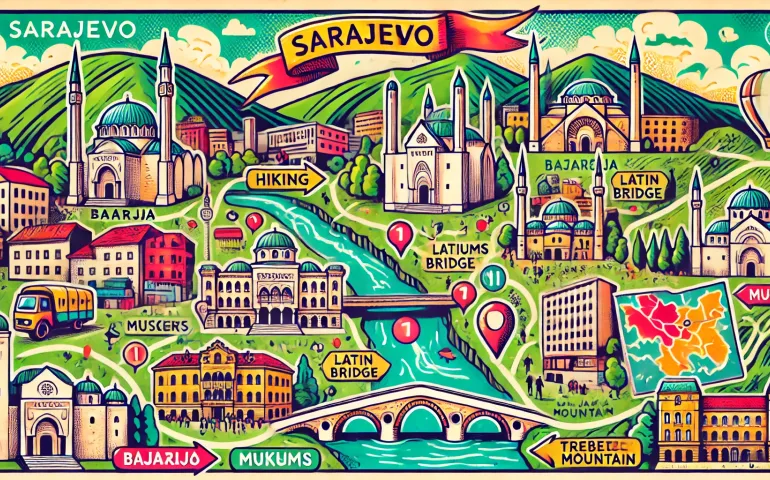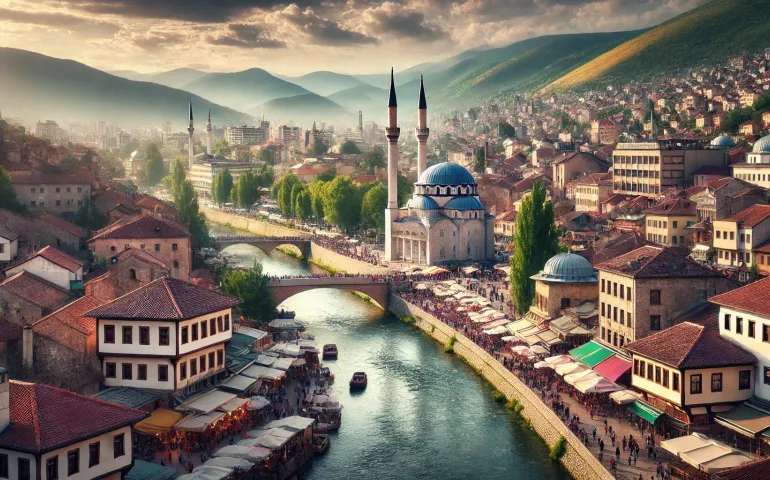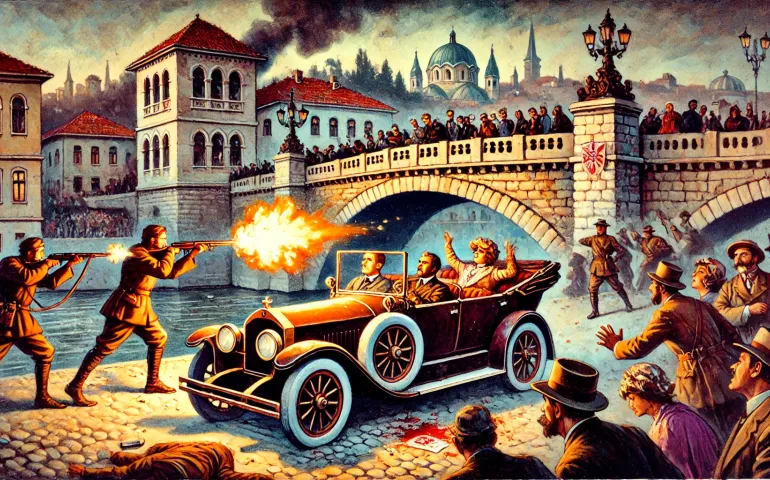About Place
- "The crossroads of cultures."
- "The Jerusalem of Europe."
- "A city with a resilient spirit."
Reasons to Visit
- Rich Historical Significance: Sarajevo has been a pivotal city throughout history, most notably for the assassination of Archduke Franz Ferdinand in 1914, which triggered World War I. The city's history is a tapestry woven with influences from the Ottoman Empire, Austro-Hungarian rule, and the Yugoslav era. Visitors can explore historical landmarks like the Latin Bridge, Sarajevo Tunnel Museum, and Baščaršija, the old bazaar.
- Cultural Fusion: Sarajevo is known for its diverse cultural and religious landscape. It's one of the few cities in the world where you can find a mosque, a Catholic church, an Orthodox church, and a synagogue within close proximity. This unique blend is a testament to the city's long-standing tradition of multiculturalism and tolerance. Festivals, music, and art scenes reflect this vibrant mix, making it a cultural hub.
- Stunning Natural Beauty: Nestled within the Dinaric Alps, Sarajevo offers breathtaking natural landscapes. The surrounding mountains, like Trebević and Bjelašnica, provide excellent opportunities for outdoor activities such as hiking, skiing, and snowboarding. The Miljacka River running through the city adds to its picturesque charm. The Vrelo Bosne park, with its spring of the Bosna River, is a tranquil escape showcasing the region's lush greenery.
Visa
- EU/EEA Citizens: No visa required for stays up to 90 days.
- US, Canada, Australia: No visa required for stays up to 90 days.
- UK Citizens: No visa required for stays up to 90 days.
- India, China, Russia: Visa required. Apply at Bosnian embassies or consulates.
- Others: Check with the local Bosnian consulate for specific requirements.
Travel Expenses
- Travel to & from Sarajevo:
- Estimated round-trip airfare for two people from a major metro city: $600.
- Hotel Cost:
- Average hotel cost per night: $70.
- Total for 3 nights: $210.
- Food Cost:
- Average meal cost per person: $15.
- Total for 6 meals for two people: $180.
- Activity Cost:
- Entry fees and tours: $50 per person.
- Total for two people: $100.
- Near Destination Travel Cost:
- Car rental and fuel: $50 per day.
- Total for 3 days: $150.
Total Estimated Cost: $1,240.

Best Itinerary
Day 1: Arrival and Old Town Exploration Arrive in Sarajevo and settle into your hotel. Start your exploration at Baščaršija, the historic bazaar, around 10 AM. Wander through its narrow streets, visit Sebilj Fountain, and explore Gazi Husrev-beg Mosque. For lunch, try Ćevapi at Željo, a local favorite. In the afternoon, visit the Latin Bridge, site of Archduke Franz Ferdinand's assassination. Spend the evening at Avlija Restaurant, enjoying traditional Bosnian dishes. Conclude your day with a stroll along the Miljacka River.
Day 2: Historical Sites and Museums Begin your day with a visit to the Sarajevo Tunnel Museum at 9 AM, learning about the city's wartime history. Head to Vijećnica, the iconic City Hall, around noon. For lunch, dine at Inat Kuća, a historic house turned restaurant. In the afternoon, explore the National Museum of Bosnia and Herzegovina. Spend your evening at the Sarajevo Brewery, tasting local brews and enjoying a hearty meal at Pivnica HS. Finish the night with a walk in the Old Town.
Day 3: Natural Beauty and Outdoor Activities Start with a morning hike or cable car ride to Trebević Mountain at 8 AM, offering stunning city views. Have lunch at Park Prinčeva, a restaurant with panoramic views of Sarajevo. In the afternoon, visit Vrelo Bosne park to enjoy its natural springs and serene landscapes. For dinner, head to Kibe Mahala, known for its authentic Bosnian cuisine. End your day with a nightcap at Café Tito, a bar filled with Yugoslav-era memorabilia.

Safety Tips
- Always carry a copy of your passport.
- Avoid discussing sensitive historical or political topics with strangers.
- Use licensed taxis and agree on fares beforehand.
- Keep an eye on your belongings in crowded places.
- Be aware of local customs and dress modestly in religious sites.
- Learn basic phrases in Bosnian; locals appreciate the effort.
- Drink bottled water to avoid stomach issues.
- Use sunscreen and stay hydrated if hiking or exploring outdoors.
- Inform someone about your daily itinerary.
- Respect local traditions and be mindful of cultural differences.
Flights
- Lufthansa: $300 per person, 8 hours from a major metro city with one layover.
- Turkish Airlines: $280 per person, 9 hours with one layover.
- Austrian Airlines: $320 per person, 7 hours with one layover.
Hotels
- Hotel Europe
- Residence Inn by Marriott Sarajevo
- Hotel President Sarajevo
- Hotel Colors Inn
- Aparthotel Vučko
Contacts
- Indian Embassy in Sarajevo: +387 33 667 701
- Police: 122
- Ambulance: 124
- Firefighters: 123
Country
Closet Airport
- Sarajevo International Airport (SJJ)
Nearest City
- Belgrade
- Serbia
Heritage Sites
- Old Bridge Area of the Old City of Mostar (nearby)
Airlines
- Lufthansa
- Turkish Airlines
- Austrian Airlines
- Air Serbia
Currency
- Bosnian Convertible Mark (BAM)
Languages Spoken
- Bosnian
- Croatian
- Serbian
Real Story
The Assassination of Archduke Franz Ferdinand:
On June 28, 1914, Sarajevo became the epicenter of a world-altering event when Archduke Franz Ferdinand of Austria and his wife, Sophie, were assassinated. The assassination is widely regarded as the spark that ignited World War I.
Background: The Balkans were a region of political tension and nationalist fervor in the early 20th century. The Austro-Hungarian Empire's control over Bosnia and Herzegovina was deeply resented by Serb nationalists, who sought to unite all South Slavs into a single nation. The Archduke, heir to the Austro-Hungarian throne, was visiting Sarajevo to inspect the imperial armed forces.
The Assassination: Gavrilo Princip, a member of the nationalist group Young Bosnia, was part of a coordinated effort to assassinate the Archduke. The group received support from the Black Hand, a secret Serbian society. On the fateful day, Franz Ferdinand and Sophie were traveling in a motorcade through Sarajevo. Initially, a bomb thrown by another conspirator missed its target. Later, as the motorcade took a wrong turn, Princip found himself unexpectedly close to the Archduke’s car. Seizing the opportunity, he fired two shots, killing both Franz Ferdinand and Sophie.
Aftermath: The assassination had immediate and far-reaching consequences. Austria-Hungary, with Germany's backing, issued an ultimatum to Serbia. The complex web of alliances and mutual defense agreements among European powers quickly escalated the conflict. Within weeks, major powers were drawn into what would become World War I, leading to unprecedented destruction and reshaping the geopolitical landscape.
Legacy: Today, the site of the assassination near the Latin Bridge is marked by a plaque. The Sarajevo Museum, located nearby, provides a detailed account of the events and their significance. The assassination remains a poignant reminder of how a single event can change the course of history.
Cuisine
Sarajevo's cuisine is a delightful blend of Eastern and Western flavors, reflecting the city's diverse cultural heritage.
Traditional Dishes:
- Ćevapi: Small grilled minced meat sausages, typically served with flatbread (somun), onions, and a creamy dairy spread called kajmak. Ćevapi are a staple of Bosnian cuisine and a must-try for visitors.
- Burek: A savory pastry made of thin, flaky dough filled with meat, cheese, spinach, or potatoes. Burek is a popular street food and is often enjoyed with yogurt.
- Sogan-dolma: Onions stuffed with a mixture of minced meat and rice, cooked in a tomato-based sauce. This dish is a favorite comfort food in Sarajevo.
Bosnian Coffee: Bosnian coffee is similar to Turkish coffee but has its own unique preparation and serving style. It is brewed in a small pot called a džezva and served in a small cup, often accompanied by a piece of sugar and a glass of water. The ritual of drinking coffee is an important social activity in Sarajevo, symbolizing hospitality and friendship.
Sweet Treats:
- Baklava: A rich, sweet pastry made of layers of filo filled with chopped nuts and sweetened with syrup or honey. Baklava is a beloved dessert in Sarajevo, reflecting its Ottoman heritage.
- Tufahija: Poached apples stuffed with walnuts and topped with whipped cream. This dessert is a delicious example of the region's use of fruit and nuts in sweets.
Local Beverages:
- Rakija: A strong fruit brandy commonly made from plums, grapes, or apricots. It is often enjoyed as an aperitif or digestive.
- Sarajevsko Pivo: The local beer brewed in Sarajevo, which has a long tradition dating back to the Ottoman period.

Culture and History
Culture of Sarajevo:
Sarajevo is often referred to as the "Jerusalem of Europe" due to its rich blend of religious and cultural traditions. This unique cultural tapestry is a result of centuries of Ottoman and Austro-Hungarian influence, interwoven with local Bosnian traditions.
- Religious Harmony: Sarajevo is known for its multi-religious character, where mosques, synagogues, Orthodox churches, and Catholic churches stand within a few hundred meters of each other. This coexistence is a testament to the city's long-standing tradition of tolerance and multiculturalism. Key religious sites include the Gazi Husrev-beg Mosque, Sarajevo Cathedral, and the Sarajevo Synagogue.
- Architectural Diversity: The city's architecture reflects its diverse history. Ottoman-era buildings like the Baščaršija and the Gazi Husrev-beg Mosque showcase Islamic architectural styles, while Austro-Hungarian structures such as the Vijećnica (City Hall) and the Sarajevo National Theatre highlight European influences. This blend creates a unique skyline that tells the story of Sarajevo's past.
- Cultural Festivals and Events: Sarajevo is a vibrant cultural hub with numerous festivals and events throughout the year. The Sarajevo Film Festival, established in 1995 during the Bosnian War, has grown to become one of the most significant film festivals in Europe, drawing international attention and celebrities. Other notable events include the Sarajevo Jazz Festival and the MESS International Theatre Festival, which highlight the city's artistic vitality.
- Literature and Art: Sarajevo has a rich literary tradition, with notable writers such as Ivo Andrić, a Nobel Prize laureate, who captured the essence of Bosnian life in his works. The city's art scene is equally dynamic, with galleries like the Ars Aevi Museum of Contemporary Art showcasing local and international artists.
- Daily Life and Social Customs: The people of Sarajevo are known for their hospitality and warmth. Coffee culture is an integral part of daily life, with Bosnian coffee being a cherished tradition. Social gatherings often take place in coffeehouses (kafanas), where friends and family come together to enjoy conversation and music.
